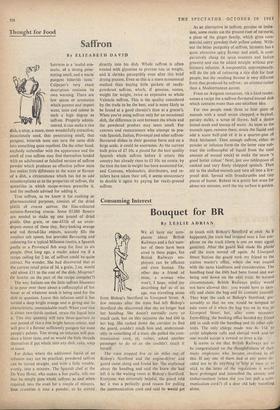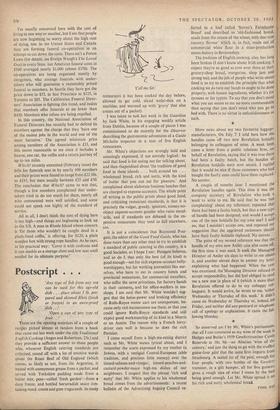Consuming Interest
Bouquet for BR
By LESLIE ADRIAN The train stopped five or six miles out of Bishop's Stortford and the engine-driver and guard came along and found her. She explained about the handbag and said she knew she had left it in the waiting room, at Bishop's Stortford. Everyone was extremely helpful, the guard told her it was a perfectly good reason for pulling the communication cord and said he would get in touch with Bishop's Stortford at once. As it happened; the train had stopped near a line tele- phone on the track (there is one on most signal, gantries). After the guard had made his phone call the train moved off again. At Liverpool Street Station the guard took my friend to the station master's office, where she was treated with the same kindliness and consideration. The handbag (and the £60) had been found and was being sent down on the next train. In normal circumstances, British Railways policy would not have allowed this: you would have to iden- tify and claim the bag and its contents yourself. They kept the cash at Bishop's Stortford, pre- sumably so that no one would be tempted to take some of it when the bag was on its way to Liverpool Street, but, after some necessary form-filling, the booking office handed my friend £60 in cash with the handbag and its other con- tents. The only charge made was 4s. 1 Id. to cover telephone calls and clerical work and no one would accept a reward or even a tip.
It seems to me that British Railways are to be congratulated on the thoughtfulness of their many employees who became involved in all this. If any one of them had at any point de- cided not to do anything to help at once or to stick to the letter of the regulations it would have prolonged and intensified the anxiety and embarrassment (when did you last pull a com- munication cord?) of a dear old lady travelling alone. I'm usually concerned here with the cost of living in one way or another, but I see that people are now beginning to worry about the high cost of dying, too. In the United States and Canada they are forming funeral co-operatives in an attempt to cut down the costs. There isn't a Forest Lawn (for details, see Evelyn Waugh's The Loved One) in every State but American funeral costs in 1960 averaged nearly $1,000 (about £350). The co-operatives are being organised mostly by clergymen, who arrange funerals with under- takers who will guarantee a reasonably priced funeral to members. In Seattle they have got the price down to $75, in San Francisco to $125, in Toronto to $85. The Californian Funeral Direc- tors' Association is fighting this trend, and insists that members offer funerals at no lower than $450. Members who refuse are being expelled.
In this country, the National Association of Funeral Directors has recently had to defend its members against the charge that they `have one of the easiest jobs in the world and one of the most lucrative.' The agreed minimum price among members of the Association is £33, and this seems reasonable to me since it includes a hearse, one car, the coffin and a return journey of up to ten miles.
Which? recently examined (February issue) the bills for funerals sent in by nearly 100 members and their prices were found to range from £22 10s. to £195, but were usually between £35 and £50. The conclusion that Which? came to was that, though a few members complained that under- takers tried to do too much for them, nearly all who commented were well satisfied, and some could not speak too highly of the standard of service.
All in all, I don't think the cost of dying here is too high—and things are beginning to look up in the US. A man in Rhode Island whose concern is `for those who wouldn't be caught dead in a plush-lined coffin,' is offering, for $120, a plain wooden box with strong rope handles. As he says, in his practical way: 'Cover it with cushions and it can double as a storage chest and low seat until needed for its ultimate purpose.'







































 Previous page
Previous page